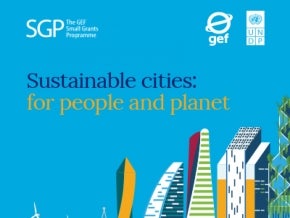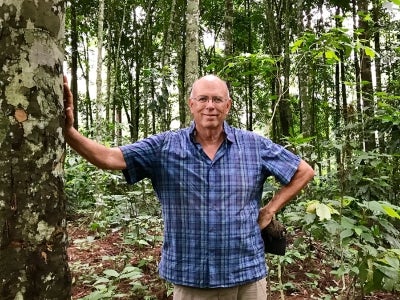
Pilar Barrera Rey is a Senior Operations Officer who manages stakeholder engagement for the Global Environment Facility, with a focus on supporting civil society organizations. She also oversees the GEF Small Grants Programme, which funds community-based environmental projects. In an interview, she reflected on the importance of seeking out diverse perspectives and voices and uplifting local conservation heroes.
Why are civil society organizations important to the GEF’s mission?
Community-based and civil society organizations play an important role in environmental stewardship in all the countries in which the GEF provides funding. They help identify needs, contribute with innovations, mobilize partnerships, and ensure decision-makers are accountable. If we’re to address the drivers of environmental degradation we need a transparent and inclusive approach, with ample participation of all stakeholders, including rural communities, Indigenous peoples, women, and other under-represented groups.
This is what makes the GEF Small Grants Programme (SGP) so important. It is a special grant window for projects managed by civil society and community-based organizations that address environmental degradation and promote innovation. This program channels funds to the grassroots level, directly helping those who are implementing projects and serving as stewards of the lands and waters. SGP-supported projects are typically in remote areas where local initiatives are directly helping to conserve and restore natural resources and combatting climate change while also enhancing peoples’ livelihoods and well-being. The SGP is implemented by the UN Development Program (UNDP) on behalf of the GEF Partnership in 125 countries around the world.
What first motivated you to work in the environmental field?
I’ve always loved the outdoors. I was born in the Colombian Andes and have always had a connection to the mountains. My maternal grandfather was a farmer who taught me to love nature and value the land. He used to say: “Land is important. They don’t make more of it. We need to take care of it.” It’s true – the planet’s resources are not limitless and we need to safeguard them for future generations. I want to believe that what I do for a living contributes to that purpose.
How did you get into this line of work?
I’m an economist by training. One of my first jobs was as a research fellow in economics at the University of Reading in the United Kingdom. After spending a few years in academia, I went back to Colombia and decided to switch gears completely. I wanted to make a difference with my job. I wanted to be close to nature and work with communities. That’s when I joined Fundacion Pro-Sierra Nevada de Santa Marta, a Colombian NGO. There, I worked with local communities and Indigenous peoples to devise and implement strategies to protect the Sierra Nevada de Santa Marta in northern Colombia – the highest coastal mountain range on earth and home to amazing biodiversity and Indigenous cultures. I fell in love with conservation and never looked back.

Is there a person you have met through your work who had a lasting impact on you?
I’ve met many extraordinary people throughout my career, but I think the ones who have had the most impact on me are the environmental leaders – women, men, and young people who, in Colombia and other developing countries, are mobilizing their communities to change behaviors and protect their local rivers, mountains, wetlands, and mangroves. These are true conservation heroes who, despite difficulties, are working hard to conserve important areas of nature and inspire others to do the same.
How has the COVID-19 pandemic affected your work?
The coronavirus has changed the way we interact with stakeholders, including civil society organizations, as international travel and in-person meetings are not currently possible. In some ways this crisis has opened up new possibilities for connection – particularly through online events. We are looking forward to convening a special GEF Consultation with Civil Society session this December, which will focus on the application of traditional knowledge by Indigenous peoples and local communities. This will be a special opportunity to bring together expertise and perspectives on the ways traditional knowledge contributes to environmental management and local sustainable development. This is an extremely important topic as approximately 25 percent of the Earth’s surface and ocean areas are managed by Indigenous peoples and local communities, and these areas hold 80 percent of the Earth’s biodiversity. Additionally, we know that Indigenous peoples’ traditional knowledge can contribute in preventing the spread of COVID-19 and other viruses, and in addressing urgent threats related to biodiversity losses. We are hoping to connect as many as 100 community leaders from around the world in a virtual format in December – holding these consultations virtually will allow us to connect more civil society participants than would have been possible at “typical” in-person consultations, where travel is necessary. We’ll continue to explore new, innovative ways to engage with civil society through and following this pandemic period.
Do you have any tips for staying connected and committed in this time?
Staying motivated can be a challenge when there’s limited interpersonal connection and every day looks like the rest. I was reading that it’s important to find what is called “intrinsic motivation” – in other words, seeing this as an opportunity to explore, learn, and grow. This is a good time to take a step back and think of different ways of doing things. In my job, this means finding new ways to engage with stakeholders and listen to other voices.
What life lessons has your work life taught you?
My work has taught me about the importance of alliances and partnerships, and bringing diverse points of view to decision-making processes. Such participatory processes take time and can sometimes be difficult, but they produce much better and more sustainable results.
What does success in your work area look like?
Success in my particular area means having a committed, vibrant group of civil society organizations engaging in GEF processes and representing the interests and views of civil society writ large. It means seeing GEF-supported projects conduct meaningful consultations that take into account the needs and interests of stakeholders and make use of their knowledge and expertise to improve project outcomes.
What do you hope to see in the world when you retire?
By the time I retire, I’d like to see a world that is more connected, not necessarily via the internet but through shared goals and values. A world that appreciates the value of natural resources and the land, just like my grandfather did.

